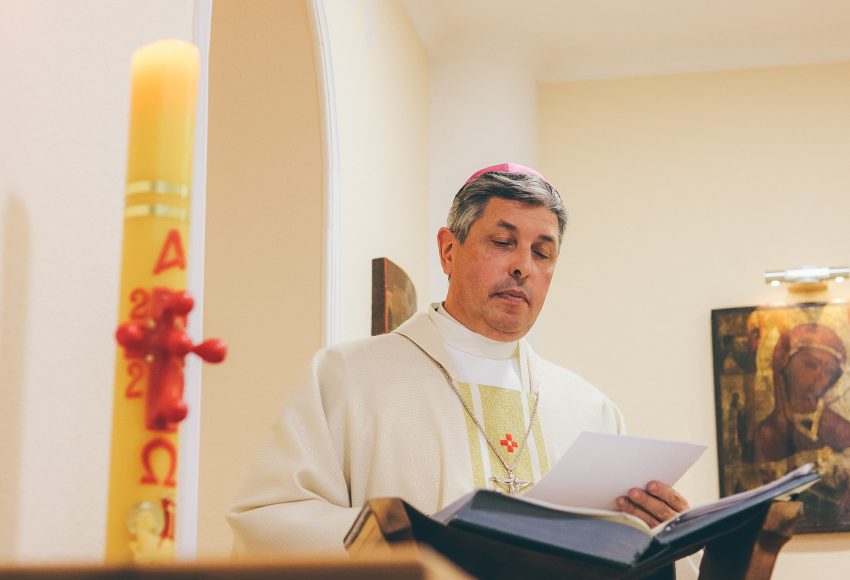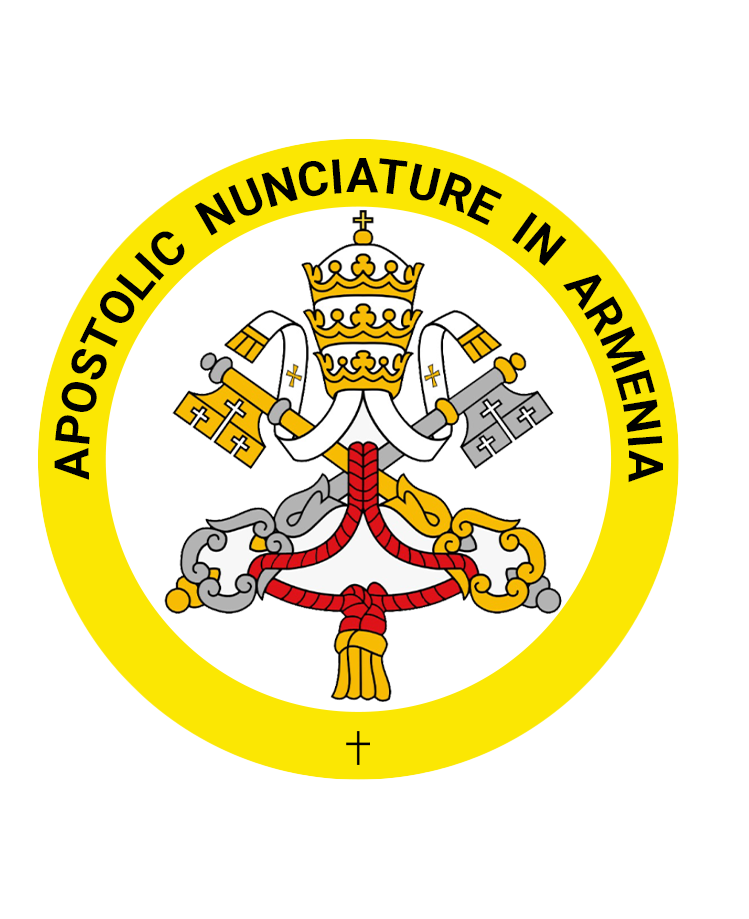
- 2 Maggio 2020
- admin
- 0 Comments
- Senza categoria, Social Media
Terza Domenica di Pasqua
Omelia di S.E.R. Mons. José A. Bettencourt, Nunzio Apostolico in Georgia e Armenia, Terza domenica della Pasqua
Homily of H.E. José A. Bettencourt, Apostolic Nuncio to Georgia and Armenia on the Third Sunday of Easter Year A ( Acts 2:14.22-28, Ps 16, 1 Pet 1:17-21, Lk 24:13-35). Live streamed from the Apostolic Nunciature in Tbilisi, 25.IV.2020.
Dear Brothers and Sisters,
This year, we celebrate the Easter Season in an unprecedented way in the midst of a health crisis brought on by the covid-19 (coronavirus) pandemic. We experience feelings of anguish, uncertainty, apprehension, confusion, incomprehension, fright, even sadness and pain… These are normal feelings that humans have felt time and time again, when they are faced with the challenges of new inexplicable demanding situations. In some ways, one might say that it parallels what the disciples felt at Easter after the passion, death and resurrection of Christ.
The readings of today’s Holy liturgy presents us with accounts of how the disciples and apostles lived during those uncertain times, when their very lives were at stake. It was thanks to their strength of faith that they went on to follow Christ and spread His Word of new hope, faith and eternal life.
In the first reading we heard the strength of the apostle Peter’s proclamation to those assembled in Jerusalem at the time of the Pentecost. In the psalm we sang “Lord you will show us the path of life”. The second reading was St. Peter’s first letter describing how we have been redeemed by the infinite treasure of the blood of Christ.
Today’s Gospel commonly known as the story of “the road to Emmaus” speaks to us and to our present state of anguish. A similar kind of anguish, perhaps like the one the disciples felt during and after Jesus’ crucifixion.
We are drawn to the experience of two disciples who left Jerusalem. Separated themselves from the rest, physically and perhaps to some extent, spiritually… They were scandalized by the events of Jesus’ passion and death, and what they saw as the failure of the Messiah and the failure of Jesus’ followers in whom they had placed their hopes. Mostly, they felt let down and pained because it appeared that Jesus was utterly vanquished and humiliated.
Their beloved spiritual Jerusalem – seemed to no longer offer the disciples anything meaningful nor important. It was felt best to abandon Jerusalem, the apostles and Jesus altogether.
So the disciples leave Jerusalem, they set off on the road, alone, with their disappointment, uncertainty and pain. The followers of Christ and his Church appeared too weak, too distant from their needs, too poor to respond to their concerns, too cold, too caught up with themselves, too inadequate. Even though, Jesus spoke to them in their naïve infancy of faith, it seemed that the events of Jesus’s life no longer spoke to them now as they had come of age and had other worries in mind. So the disciples left. This at times may also parallel our very own personal journey of faith. The temptation to leave our faith for so many reasons.
The disciples left because they began to think that Jesus could not have possibly been the Messiah. It was all a mistake. In our present state of a world health pandemic crisis, many of us, just like the two disciples of Emmaus; look for answers from the world at large because our spiritual home seems, perhaps, inadequate.
Upon their departure from Jerusalem, while they were on the road to Emmaus, the “incognito Jesus” upbraided the disciples, called them “foolish and slow of heart to believe” and, starting with Moses and all the prophets, interpreted for them all the passages of Sacred Scripture that referred to why the Messiah “had to suffer these things to enter into his glory.” Doubtlessly, Jesus would have mentioned Isaac’s carrying the wood on his shoulders for the sacrifice of his son, Moses’ leading the Israelites in the Passover, through the Red Sea and desert into the promised land, Isaiah’s prophecies of the Suffering Servant, the Book of Wisdom’s description that the just man would be beset by evil doers, the Psalms’ foretelling so many details of the crucifixion, and so much more.
As Jesus was talking, the light of truth began to penetrate the great darkness of the disciples’ sadness. Their hearts began to burn and they began to make sense of all that had happened, not only to Jesus but within themselves.
It was in listening anew to the Word of God that the disciples rediscovered the covenant and love of God for them.
As we are afflicted with uncertainties, worries and sadness, on this particular stretch of our road of life, it is the right time to listen anew to the Word of God. Listen to Christ in his scripture as we meditate on it in the many liturgies livestreamed, recorded and written for our benefit by the Church’s ministers.
We must also recognize Jesus, who at times may seem “incognito to our eyes”, but who is present in our midst, especially as we gather around modern means of communication to celebrate the Word and Eucharist in the Holy Liturgy. It is our spiritual bread and sustenance. In the breaking of this real spiritual sustenance, Christ is recognized.
After the encounter with Jesus, listening to Jesus and breaking bread with Jesus, the disciples could not rest, they could not settle themselves in Emmaus. Although it was night and the road from Emmaus back to Jerusalem was long and dark, and they were tired from a long and exhausting day, they had to return to Jerusalem that very night. They burst through the door and ran those seven miles in pitch darkness in order to tell the apostles, that they had encountered the Risen Lord Jesus. They could not wait until the morning to share the good news. So beautiful, hopeful and joyful was the news of the Risen Christ!
Dear brothers and sisters, in these days when we are under particular pressure, following the indications of the authorities and following expert advice from health officials, “staying home”, practicing “social distancing”, seeking to do our part to help solve this health pandemic crisis, – even though at times we might find ourselves downtrodden, let us not fall into despair as the two disciples did at the beginning of today’s Gospel.
Let us not give-up and leave our spiritual Jerusalem. But instead let us gather closer to the Word of God and Spiritual communion with Christ’s Body. Let us support each other keeping in touch through modern technology. Let us show our gratitude for those who sacrifice themselves, serving others, to see us through this crisis. Let us grow closer as a believing family to overcome the real physical and psychological challenges of this day. Even in following the health authorities’ physical restrictions, let us set out spiritually in the strength of our faith in the Risen Lord. Let us grow in attentiveness to what may seem – “to our human eyes” – the unrecognizable Jesus and be confidante in the words of the psalm “the Lord will show us the path of life”.
Amen.

